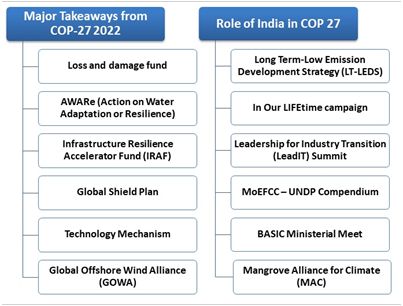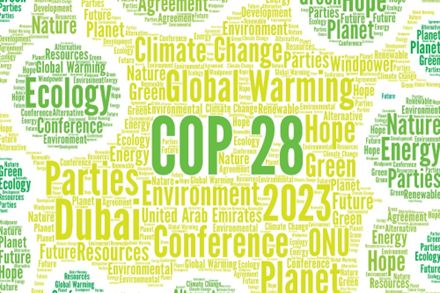1. INTRODUCTION- THE CLIMATE SUMMIT OF A GENERATION
The Conference of the Parties, often abbreviated as COP, is a significant international forum dedicated to addressing the global challenge of climate change. This series of meetings brings together representatives from countries worldwide to discuss, negotiate, and collaborate on actions aimed at combating climate change and its consequences. COP gatherings are instrumental in shaping global climate policy, fostering international cooperation, and implementing commitments made under various climate agreements, such as the United Nations Framework Convention on Climate Change (UNFCCC) and the Paris Agreement. COP meetings serve as a platform for nations to share their progress, set targets, and strategize the way forward in the collective effort to mitigate and adapt to climate change.
The COP serves as the highest authority within the Convention, with representation from all Convention Parties. During COP sessions, these Parties assess Convention implementation, review adopted legal instruments, and make decisions to enhance the Convention's effectiveness. This includes considerations of institutional and administrative arrangements. A critical COP responsibility involves evaluating national communications and emission inventories submitted by Parties to gauge the impact of their actions and their progress toward the Convention's ultimate goal. Ordinarily, the COP convenes annually, unless a different schedule is determined by the Parties. The inaugural COP gathering took place in Berlin, Germany in March 1995. Typically, COP sessions are hosted in Bonn, the location of the secretariat. However, it's worth noting that a Party may volunteer to host a session, and this can lead to variations in the COP's venue. Just as the COP Presidency rotates among the five recognized UN regions—Africa, Asia, Latin America and the Caribbean, Central and Eastern Europe, and Western Europe and Others—there is a tendency for the COP's location to shift among these regional groups as well.
2. WHAT IS COP 28?
The forthcoming leadership of COP 28 is dedicated to ensuring a transparent and all-encompassing process in the run-up to COP 28, set to be held in Dubai, United Arab Emirates, from November 30 to December 12, 2023.
Both the current Presidency and the incoming Presidency plan to involve Parties at the ministerial, Head of Delegation, and technical levels throughout the year. Their goal is to establish the necessary foundations for a successful COP 28 that steers the world towards a low-emission and climate-resilient future, encourages ambitious climate measures, and supports their implementation. This includes the associated assistance.
The Presidency and Incoming Presidency are firmly committed to collaborating in a coherent, open, and inclusive manner as they work towards COP 28. They will work closely with the Chairs of the subsidiary bodies and the secretariat to achieve the objectives.
The conference will consist of the following components:
- The 28th gathering of the Conference of the Parties (COP 28).
- The fifth session of the COP, functioning as the Meeting of the Parties to the Paris Agreement (CMA 5).
- The 18th meeting of the COP, acting as the Meeting of the Parties to the Kyoto Protocol (CMP 18).
- The 59th session of the Subsidiary Body for Implementation (SBI 59).
- The 59th session of the Subsidiary Body for Scientific and Technological Advice (SBSTA 59).
1. Two Week Schedule of COP 28
| OPENING SESSION |
|
World Climate Action Summit
|
|
Health/Relief, Recovery and Peace
|
|
Finance/Trade/Gender Equality/Accountability
|
|
Energy and Industry/Just transition/Indigenous People
|
|
Multilevel action, Urbanization, and Built Environment Transport
|
| DAY OF REST |
|
Youth, Children, Education and Skills
|
|
Nature, Land Use, and Ocean
|
|
Food, Agriculture and Water
|
| FINAL NEGOTIATIONS |
In a communication dated January 13, 2023, the UNFCCC Secretariat conveyed that Sultan Ahmed Al Jaber, who serves as the Minister of Industry and Advanced Technology and as the UAE Special Envoy for Climate Change, has been designated as the President of COP 28.
Both the Egyptian Presidency of COP 27 and the forthcoming COP 28 Presidency are collaborating in informal consultations to engage governments at the ministerial, Head-of-Delegation, and technical levels. The aim of these consultations is to lay the foundation for a successful COP 28, which will drive worldwide progress towards a low-emission, climate-resilient world. It will also encourage ambitious climate action and facilitate implementation, along with the necessary support.
COP 28 will see the conclusion of the inaugural Global Stocktake for evaluating the implementation of the Paris Agreement. Each stocktake is a two-year process that recurs every five years and serves to assess global advancements towards climate goals. The first Global Stocktake aligns with the midpoint in the execution of the 2030 Agenda for Sustainable Development, including its Sustainable Development Goals, notably Goal 13 (pertaining to climate action). Preceding this, a mandated workshop on the elements of the Global Stocktake outcome will be held in the UAE in October.
In a communication addressed to the participating parties in July 2023, the Incoming Presidency outlined four central focal points for COP 28:
- Accelerating the transition to cleaner energy and reducing emissions before the year 2030.
- Transforming climate finance by delivering on previous commitments and establishing the groundwork for a new financial agreement.
- Placing a significant emphasis on nature, people, lives, and livelihoods in climate action efforts.
- Promoting inclusivity to ensure that COP 28 is the most inclusive conference of its kind ever held.
2. Brief Analysis of Key COP27 Outcomes
- Global Stocktake of Paris Agreement
The Global Stocktake of the Paris Agreement (GST) is a procedure designed to evaluate the progress in implementing the Paris Agreement with the aim of assessing the collective global advancement toward achieving its long-term objectives. The GST is instrumental in gauging global progress in areas such as mitigation, adaptation, and the means of implementation. The initial GST, spanning from 2021 to 2023, will be repeated every five years. Its findings will provide countries with valuable insights to update and improve their Nationally Determined Contributions (NDCs), climate actions, and the support they offer. This process is of paramount importance in expediting efforts to combat climate change. The global stocktake process comprises three key components: 1) Gathering and preparing information; 2) conducting a technical assessment; and 3) Examining the results. The final stage of the GST, the consideration of results, will occur at COP28 in 2023. During these sessions, discussions will center around the ongoing technical phase of the inaugural GST and its anticipated political outcomes, which are set to be addressed at COP 28. - Setup of Loss and Damage fund
One of the most notable accomplishments of COP27 is the establishment of a "loss and damage" fund (LDF) aimed at assisting vulnerable nations in coping with the increasing costs associated with climate-related damage caused by extreme weather events and rising sea levels. The agreed-upon deal on loss and damage at COP27 represents a positive stride forward, yet it was met with considerable criticism regarding the lack of swift action by countries to reduce greenhouse gas emissions and limit global warming to below 1.5°C. Leaders missed the opportunity to expedite the necessary, substantial reductions in emissions crucial for mitigating climate-related damage. Nonetheless, due to the complex nature of the negotiations, it was not feasible to take definitive steps toward emissions reduction and a transition away from fossil fuels.
Uzbekistan, while not deemed an eligible beneficiary under the newly established UNFCCC "loss and damage" fund, may contemplate the establishment of its own national "loss and damage" fund to address the severe shocks resulting from climate change. This initiative is prompted by the nation's heightened vulnerability, particularly in relation to water-related issues.

Figure 1: COP 27 (Source: https://www.iasparliament.com/current-affairs/conference-of-parties-cop-27-part-2) - Safeguarding Food Security and Ending
Hunger
The decision on COP27's cover also emphasizes the importance of "ensuring food security and eliminating hunger" as a core priority. It highlights that safeguarding water systems plays a vital role in helping communities better shield themselves from the impacts of climate change. This represents a step forward compared to the Glasgow Climate Pact of 2021, which didn't mention agriculture, food, or water. However, it's worth noting that this decision doesn't allocate new dedicated funding for food systems from governments. The overarching cover decisions, known as the Sharm El-Sheikh Implementation Plan, encompass the progress achieved during the negotiations and various related events, including the Marrakesh Partnership for Global Climate Action. They address a wide range of topics, including science, ambition, implementation, energy, mitigation, adaptation, loss and damage, early warning systems, just transition, finance, technology, capacity building, transparency, assessing progress, Article 6, oceans, forests, and actions taken by non-Party Stakeholders. - Koronivia Joint work on Agriculture
The Koronivia Joint Work on Agriculture (KJWA) deals with agricultural matters, involving workshops and expert meetings that take into account the susceptibility of agriculture to climate change. It also explores strategies to enhance food security. The decision made at COP27 encourages parties and other stakeholders to step up their endeavours in advancing sustainable agriculture, with the ultimate goal of eliminating hunger and poverty while ensuring food security. - Boosting Low Emission Energy
The Glasgow Climate Pact mandated the consideration of issues related to the Work Programme for Urgently Scaling up Mitigation Ambition and Implementation (Mitigation Work Programme - MWP). This program aims to explore ways to increase mitigation efforts before 2030. When it comes to temperature targets, there were suggestions to emphasize the importance of staying below 1.5°C, while other nations preferred to reference the comprehensive temperature goals outlined in the Paris Agreement, which involve staying well below 2°C and making efforts to limit long-term temperature rise to 1.5°C.
The Sharm el-Sheikh implementation plan includes mentions of bolstering "low-emission" energy sources, including renewables. The text also lends support to the plans of many fossil fuel-producing countries that aim to utilize emerging carbon capture technology to reduce emissions rather than reducing production. Notably, the final text now encourages the reform of major lenders such as international financial institutions (IFIs) and multilateral development banks (MDBs) for the first time. - Phase Down Coal use
The goal, outlined in Glasgow, was to phase out all fossil fuels, not just coal. Developed countries pushed for an agreement to reach peak global emissions before 2025, to decide a clear way to do so, and to do so for all fossil fuels. All of those factors were left out of the final cover decision, which stipulated that "rapid, deep, and sustained reductions in greenhouse gas emissions" are needed by 2030 to keep global warming to 1.5 °C above pre-industrial levels.
Since oil, gas, and coal must be fairly phased out in order to keep warming to 1.5 °C, this choice runs the risk of significantly increasing new oil and gas output. - Long Term Climate Finance
This process aims to enhance the mobilization of climate finance resources from a variety of channels, encompassing public, private, bilateral, multilateral, and other funding sources. According to the Paris Agreement, a fresh collective quantified goal for climate finance (NCQG) must be established before the 2025 Conference of the Parties (CMA), with a minimum threshold of USD 100 billion per year.
Subsequently, during the Glasgow negotiations, Parties decided to structure their efforts through an ad hoc work program, which includes technical expert dialogues (TED), submissions, ministerial dialogues, stocktakes, and guidance. During the negotiations, discussions revolved around determining the specific level of the new goal. Developing countries engaged in substantial debates regarding the sources of support, and there were also disagreements concerning the role of the private sector and an expanded group of donor countries. - Action for Climate Empowerment
The UNFCCC employs the term "Action for Climate Empowerment" (ACE) to refer to activities specified in Article 6 of the Convention and Article 12 of the Paris Agreement. These activities encompass education, training, public awareness, public participation, public access to information, and international cooperation. COP27 approved a four-year action plan as part of the Glasgow work program on ACE. This plan places emphasis on prompt action through activities that are clear, time-bound, and short-term in nature. It is guided by the key areas of focus outlined in the Glasgow work program, which include policy coherence, coordinated action, tools and support, and monitoring, evaluation, and reporting. - Gender and Climate change
Parties are strongly encouraged to expedite their actions in furthering the implementation of the enhanced Lima Work Programme on Gender and its gender action plan (GAP). This includes:
- Urging parties and relevant organizations to enhance the utilization of data that is categorized by sex and incorporate gender analysis into the execution of climate policies, plans, strategies, and actions.
- Suggesting that the ILO (International Labour Organization) consider arranging a workshop or dialogue.
- Emphasizing the necessity of advancing efforts toward achieving gender balance and increasing inclusivity within the UNFCCC process. This can be accomplished by encouraging future COP Presidencies to nominate women as high-level climate champions, prompting parties to enhance gender balance in their national delegations, and encouraging event organizers to ensure gender balance in their events.
- Encouraging parties and relevant public and private entities to bolster the responsiveness of climate finance to gender considerations.
3. Focus Of COP 28
The 28th Conference of the Parties to the UN Framework Convention on Climate Change will take place in Dubai, hosted by the United Arab Emirates (UAE), from November 30 to December 12, 2023. COP28 is poised to be a pivotal moment for global climate action. The two-week thematic program under the COP28 Presidency is focused on addressing the Global Stocktake and bridging the gaps toward 2030. This conference holds significant importance as it introduces the inaugural "global stocktake," which involves a comprehensive evaluation of progress with respect to the goals outlined in the Paris Agreement, encompassing mitigation, adaptation, and means of implementation.
COP28 is also expected to finalize critical work related to long-anticipated deliverables. This includes decisions on a global goal for adaptation, the specifics of the loss and damage finance facility, a global finance goal, closing the substantial emissions gap, accelerating the transition to clean energy and a 'Just Transition', and work in various other areas. It's important to note that the current geopolitical climate adds uncertainty to the prospects of achieving meaningful outcomes at COP28.

Figure 2: Road to the COP 28 (Source: https://emergingag.com/the-road-to-the-cop-28/)
- World Climate Action Summit
The World Climate Action Summit brings together heads of state and government with leaders from civil society, business, youth, Indigenous Peoples' groups, frontline communities, science, and other fields to talk about specific initiatives and strategies for accelerating climate action. The summit acts as a crucial venue for key announcements and aims to give the remaining COP impetus and direction. - Health/Relief, Recovery and Peace
The first Health Day and climate-health ministerial, which seek to forge agreement on the most important steps for the health system's response to climate change, will be held at COP28 in order to support policies and investments that safeguard lives and livelihoods and support community resilience and stability.
Relief, Recovery, and Peace Day will put the spotlight on boosting climate action, accelerating adaptation, avoiding and repairing loss and damage, including fragile and conflict-affected settings. These contexts face significant obstacles to obtaining climate finance. - Finance/Trade/Gender/Accountability
On this day, the primary emphasis will be on achieving scale, improving access, and enhancing affordability. This will be accomplished through a reform of the international financial system, the development of sustainable financial markets, and the reinforcement of voluntary carbon markets. The overarching objective is to mobilize private sector funding and enhance fairness. At COP28, trade will also play a new role in promoting climate-smart and equitable growth, which encompasses actions like decarbonizing supply chains, facilitating transitions, and bolstering resilience.
Gender Equality Day will centre on policymaking that is responsive to gender considerations and improving access to financial resources. The goal is to facilitate a Just Transition that not only advances gender equality but also enables the complete, equal, and meaningful participation of women and girls in climate-related activities.
Given the global emphasis on private sector involvement, commitments, and financial contributions, the program will also scrutinize accountability mechanisms designed to translate commitments and promises into concrete results, all the while enhancing transparency. - Energy and Industry/Just Transition/Indigenous
People
On this particular day, the primary focus will revolve around the mechanisms and routes for achieving swift Decarbonization, fostering job creation, and opening up economic prospects throughout the entire energy and industrial value chains. This approach will encompass a comprehensive perspective on the just transition and socio-economic considerations spanning various sectors, with energy being a noteworthy example. Key subjects within the energy and industry segment will encompass extensive deployment of renewable energy sources, heightened energy efficiency, initiatives and measures aimed at reducing emissions in heavy industries like steel, cement, and aluminium, unlocking the potential of hydrogen, and the reduction of carbon emissions in the oil and gas sectors. This will involve methods such as methane reduction and the application of technologies for carbon management. Furthermore, the day will address the issue of universal energy access and the needs of workers undergoing transitions within the energy sector. It will also place a special emphasis on the critical role of cooling in both mitigation and adaptation efforts.
Indigenous Peoples Day will serve to acknowledge the significance of the intergenerational knowledge, practices, and leadership of Indigenous Peoples in climate action and their role in preserving the health of the planet. Additionally, it will explore mechanisms for enhancing their direct access to financial resources. - Multilevel Action, Urbanization and Built
Environment/Transport
COP28 will witness a momentous gathering of community leaders, encompassing mayors, governors, members of parliament, business figures, and representatives from civil society, all coming together with a shared purpose of expediting climate action at various tiers of government and within society as a whole.
On this day, the spotlight will be on showcasing strategies for shifting towards built environments and infrastructure that are both low in carbon emissions and resilient. It will also emphasize sustainable and circular waste management systems, as well as sustainable modes of transportation and freight. This day, in particular, will focus on initiatives within urban areas, where factors such as population growth, economic activities, and greenhouse gas emissions intersect. - Youth, Children, Education and Skills
The aim of this day is to provide young individuals with the ability to influence the results of COP28 and subsequent climate endeavours. This is especially significant when taking into account the greater vulnerabilities and consequences that climate change poses for children and young people.
On this day, the focus will be on achieving fairness in representation, enhancing mechanisms for involvement, and fairly distributing resources across the various themes and policy tracks of COP28. - Nature, Land Use and Oceans
COP28 will concentrate on providing mutual advantages for climate and nature through a variety of financial methods and packages. These will be collaboratively developed with local communities and Indigenous Peoples to ensure the sustainable preservation and management of natural carbon storage areas and regions of high biodiversity.
Furthermore, on this day, there will be an effort to expedite the commitment of the private sector to accountability frameworks that have a positive impact on nature. - Food, Agriculture and Water
Climate change is exerting significant pressure and presenting substantial risks to the agri-food and water systems that form the foundation of human well-being. Simultaneously, these systems play a pivotal role in contributing to climate change, with one-third of all human-caused greenhouse gas emissions originating from agri-food systems, and 70% of global freshwater consumption being devoted to agricultural production.
In terms of food and agriculture, the specific areas of focus include investments in innovation, the adoption of regenerative agricultural practices, and the development of national strategies for transformation. These efforts will be supported by financial mechanisms and project preparation. In the context of water-related initiatives, there will be an emphasis on actions such as the restoration and preservation of freshwater resources, the development of resilient urban water infrastructure, and the integrated governance and management of water and food systems.
3. LIST OF SUMMITS/MEETINGS SINCE DECEMBER 2022
(Post COP 27, Egypt – November 2022)
| S.no | Name | Date | Place | Brief |
| 1. | GLF-Luxembourg Finance for Nature :What comes next | 7/03/2023 | Online and Luxembourg | "GLF Luxembourg Finance for Nature" is part of the Global Landscapes Forum (GLF) initiative, which seeks to promote sustainable land use and landscape management. The focus of this specific event is on financing nature conservation and sustainable land use practices. |
| 2. | 3rd Global Soil Biodiversity Conference | 13/03/2023 – 15/03/2023 | Dublin, Ireland | It is an international gathering that focuses on the importance of soil biodiversity, which plays a critical role in sustaining ecosystem health and productivity. The conference serves as a platform for scientists, researchers, and policymakers to exchange knowledge and discuss the latest research findings related to soil biodiversity and its impact on global sustainability. Key topics typically covered in this conference include the role of soil organisms in nutrient cycling, soil health, and carbon sequestration, as well as the conservation and restoration of soil biodiversity. |
| 3. | The 6th Nordic Conference on Climate Change Adaptation, NOCCA23 | 17/04/2023 – 19/04/2023 | Reykjavík, Iceland and online (day 1 only) | It is a regional conference dedicated to addressing climate change adaptation challenges in the Nordic countries. This conference brings together experts, researchers, policymakers, and practitioners to discuss the latest advancements in climate adaptation strategies, share best practices, and develop collaborative solutions. |
| 4. | UN 2023 Water Conference | 22/03/2023 – 24/03/2023 | New York, NY, United States | The United Nations frequently convenes conferences and events related to water and sustainable water management. These conferences typically focus on addressing critical issues such as water scarcity, access to clean water, sanitation, and sustainable water resource management. |
| 5. | Climate and Clean Air Conference 2023: Air Quality Action Week | 29/05/2023 – 2/06/2023 | Bangkok, Thailand at the United Nations Conference Centre | The week-long event featured a series of plenary and breakout sessions that highlighted the latest insights, proven solutions, and new progress in addressing air pollution and its impact on climate. The sessions focused on clean air success stories, air pollution and its impact on climate change, and the role of cities and subnational governments in addressing air pollution. The conference aimed to identify new opportunities, develop capacities, facilitate cooperation and knowledge exchange, and promote action to address air pollution and its impact on climate change. |
| 6. | Bonn Climate Change Conference | 5/06/2023 – 15/06/2023 | Bonn, Germany | The conference aimed to lay the groundwork ahead of a "global stocktake" that will see nations assessing their progress towards climate goals. The conference featured a series of plenary and breakout sessions that highlighted the latest insights, proven solutions, and new progress in addressing climate change. |
| 7. |
The 36th Conference of the International Association of Climatology | 3/07/2023 – 7/07/2023 | Bucharest, Romania | The conference had the general theme of "Climate, water and society: changes and challenges" and aimed to bring together researchers, professionals, specialists, and managers from different institutions and countries to explore the latest research in the field of climatology, hydrology, and other related fields. The conference provided a platform for exchanging information, knowledge, and experiences, and promoting cooperation and knowledge exchange. |
| 8. | World Water Week 2023 | 27/08/2023 – 1/09/2023 | Stockholm, Sweden and online | The theme of the event was "Seeds of Change: Innovative Solutions for a Water-Wise World," which aimed to encourage a rethink of how water is managed and urged consideration of the ideas, innovations, and governance systems that are needed in an increasingly unstable and water-scarce world. The event drew on the latest scientific knowledge and experiences from around the world to explore how water can be a powerful tool for addressing the water crisis, global warming, biodiversity loss, and poverty. |
| 9. | 8th Asia-Pacific Climate Change Adaptation Forum (APAN Forum) | 28/08/2023 – 1/09/2023 | Incheon City, Republic of Korea | The event aimed to enhance understanding of climate change adaptation issues, approaches, and policies for effective planning, provide a comprehensive report on actions taken and progress made to address knowledge, policy, and funding gaps since the last APAN Forum, and serve as a platform for accelerating action and implementing practical solutions to address the challenges of climate change. |
| 10. | Africa Climate Week (ACW 2023) | 4/09/2023 – 8/09/2023 | Nairobi, Kenya | The event aimed to provide region-focused contributions on energy systems and industry, cities, urban and rural settlements, infrastructure, and transport, land, ocean, food, and water, societies, health, and livelihoods, and economies. |
| 11. | 2023 Sustainable Development Goals Summit | 9/09/2023 – 20/09/2023 | New York, NY, United States | The Summit aimed to provide high-level political guidance on transformative and accelerated actions leading up to 2030. It focused on people and ways to meet their basic needs through the implementation of the 2030 Agenda. The Summit adopted a decisive, action-oriented political declaration, highlighting the collective commitment to build a sustainable, inclusive, and prosperous world by 2030. |
| 12. | Climate Ambition Summit 2023 | 20/09/2023 | New York, NY, United States | The event aimed to provide high-level political guidance on transformative and accelerated actions leading up to 2030. The summit called for 2025 and 2030 targets, coverage of scope 3 emissions, just transition plans to stop and phase out fossil fuels, actual emissions, and more. The summit provided a platform for Member States and all stakeholders to deliver a 'Rescue Plan for People and Planet' by announcing commitments and initiatives that will help drive SDG transformation for inclusion and sustainability in the years ahead. |
| 13. | Climate Week NYC 2023 | 18/09/2023 – 24/09/2023 | New York, NY, United States | The event aimed to push the world to put their climate plans into action and drive change, speed up progress, and champion change that is already happening. |
| 14. | Adaptation Futures 2023 | 2/10/2023 – 6/10/2023 | Montreal, QC, Canada, and online | The conference aimed to learn from Indigenous,
local knowledge and voices in climate change adaptation research,
policies, practices, and actions around the world, accelerate the
adoption of transformative adaptation for long-term resilience,
bring marginalized voices, especially from the Global South, to the
forefront in pursuit of climate justice, equity, diversity, and
inclusion, and accelerate momentum towards the Global Goal on
Adaptation and the Global Stocktake. |
| 15. | A New Vision for Earth: GLF Nairobi 2023 Hybrid Conference | 11/10/2023 – 12/10/2023 | Nairobi, Kenya | The conference explored local solutions to the
global climate and ecological crises in 2023, and the themes
included Time to Innovate, Transformative Adaptation, Integrated
Assessment, When We Can No Longer Adapt, Equity and Justice in
Adaptation, Adaptation and Mitigation, and Teaching and Learning Adaptation in a Changing Climate. The conference also amplified the voices of leading scientists, activists, Indigenous leaders, financiers, policymakers, and youth. |
4. CONCLUSION
In conclusion, COP 28 is expected to be a crucial moment for the world to rally and meet the climate challenge, deliver for people and nature, and accelerate the adoption of transformative adaptation for long-term resilience. Expectations from COP 28 are high, and various organizations and stakeholders have outlined their asks and priorities for the conference. Here are some of the expectations from COP 28:
- A phase-out of all fossil fuels and their subsidies, including targets for renewables.
- Fast-tracking the energy transition and slashing emissions before 2030
- Transforming climate finance, by delivering on old promises and setting the framework for a new deal on finance
- Putting nature, people, lives, and livelihoods at the heart of climate action
- Mobilizing for the most inclusive COP ever
- A commitment to zeroing out methane emissions by 2030
- A negotiated outcome, an action agenda, and a call to action
- A focus on emissions cuts pre-2030 and money
- A paradigm shift towards a low-emission and climate-resilient world, ambitious climate action, and implementation
- A course correction towards a fairer world and strong decisions at COP28
- A review of the progress made since the Paris Agreement and the first Global Stocktake
- A phase-out of coal and a transition to renewable energy
- Helping the most vulnerable communities adapt to and recover from the effects of climate change that they are already experiencing
- Limiting global warming to 1.5° C (2.7° F) above pre-industrial levels
The conference is expected to focus on fast-tracking the energy transition, slashing emissions, transforming climate finance, and putting nature and people at the heart of climate action. The conference is also expected to review the progress made since the Paris Agreement and the first Global Stocktake and pave a path to a fairer world. However, there are concerns that the world is running out of time to address the climate crisis, and that the window for action is closing. The failure of COP27 to deliver a resolution to phase out fossil fuels and meet the 1.5C goal has raised concerns about the prospects for COP28. Overall, COP 28 is expected to be a crucial moment for the world to rally and meet the climate challenge, deliver for people and nature, and accelerate the adoption of transformative adaptation for long-term resilience. Nevertheless, there is still hope that COP28 will deliver strengthened emissions reduction targets, a commitment to peak global emissions by 2025, a plan to turbocharge the clean energy revolution, and a meaningful agreement on how to scale up finance to support developing nations to decarbonize their economies. The world is watching and waiting for COP28 to deliver the action needed to address the climate crisis and build a sustainable future for all.
The content of this article is intended to provide a general guide to the subject matter. Specialist advice should be sought about your specific circumstances.


